The global custom vacation planning market is projected to reach USD 3,848.9 million by 2035, recording an absolute increase of USD 2,162.2 million over the forecast period. The market is valued at USD 1,686.7 million in 2025 and is set to rise at a CAGR of 8.6% during the assessment period. The overall market size is expected to grow by nearly 2.3 times during the same period, supported by increasing demand for personalized travel experiences worldwide, driving demand for efficient customization platforms and growing investments in artificial intelligence and digital travel technology projects globally. However, high technology development costs and complex integration requirements for advanced planning systems may pose challenges to market expansion.
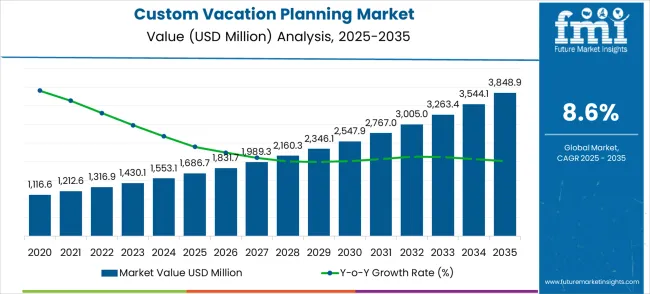
Between 2025 and 2030, the custom vacation planning market is projected to expand from USD 1,686.7 million to USD 2,547.9 million, resulting in a value increase of USD 861.2 million, which represents 39.8% of the total forecast growth for the decade. This phase of development will be shaped by rising demand for personalized travel experiences and digital transformation solutions, product innovation in AI technologies and automated planning systems, as well as expanding integration with smart travel platforms and machine learning initiatives. Companies are establishing competitive positions through investment in advanced AI technologies, user experience solutions, and strategic market expansion across individual, group, and corporate travel applications.
From 2030 to 2035, the market is forecast to grow from USD 2,547.9 million to USD 3,848.9 million, adding another USD 1,301.0 million, which constitutes 60.2% of the overall ten-year expansion. This period is expected to be characterized by the expansion of specialized AI customization systems, including intelligent recommendation engines and integrated booking solutions tailored for specific travel preferences, strategic collaborations between technology providers and travel service companies, and an enhanced focus on user personalization and eco-conscious travel solutions. The growing emphasis on automating travel planning processes and optimizing customer experience will drive demand for advanced, AI-powered custom vacation planning solutions across diverse travel market segments.
| Metric | Value |
|---|---|
| Market Value (2025) | USD 1,686.7 million |
| Market Forecast Value (2035) | USD 3,848.9 million |
| Forecast CAGR (2025-2035) | 8.6% |
The custom vacation planning market grows by enabling travel companies and consumers to create personalized travel experiences through advanced technology platforms and specialized service offerings. Travel service providers face mounting pressure to differentiate their offerings and improve customer satisfaction, with AI-powered customization systems typically providing 60-75% better customer engagement than traditional planning methods, making personalized planning solutions essential for competitive travel operations. The travel industry's need for enhanced customer experience and operational efficiency creates demand for comprehensive planning solutions that can handle diverse travel preferences, maintain high service quality, and ensure seamless booking experiences without compromising personalization standards. Government initiatives promoting tourism development and digital transformation drive adoption in individual travel, group travel, and corporate travel applications, where personalized service delivery has a direct impact on customer retention and market competitiveness. However, high technology investment requirements and the complexity of integrating AI systems with existing travel infrastructure may limit adoption rates among smaller travel agencies and developing tourism markets with limited technological resources.
The custom vacation planning market represents a transformative travel technology opportunity driven by post-pandemic travel recovery, evolving consumer preferences toward personalized experiences, and the rapid adoption of artificial intelligence across the travel industry. As travelers worldwide seek unique, tailored experiences and travel companies face pressure to differentiate their offerings through superior customer engagement, custom vacation planning platforms are evolving from luxury services to essential competitive tools for travel service providers.
The convergence of AI-powered personalization, mobile-first consumer behavior, and pent-up travel demand creates unprecedented growth opportunities across multiple market segments. The market's explosive growth trajectory from USD 1,686.7 million in 2025 to USD 3,848.9 million by 2035 at 8.6% CAGR reflects fundamental shifts in how consumers discover, plan, and book travel experiences.
Geographic expansion opportunities are particularly pronounced in Asia-Pacific markets, where China (11.6% CAGR) and India (10.8% CAGR) lead global growth through digital transformation, rising disposable income, and government tourism development initiatives. The dominance of AI customization (58.4% market share) over manual customization and the preference for individual travel experiences (64.7% share) provide clear strategic focus areas, while emerging group travel applications and corporate travel integration open new revenue streams with enhanced margin potential across diverse geographic markets.
Strengthening the dominant AI customization segment (58.4% market share) through advanced machine learning algorithms, predictive analytics systems, and automated recommendation engines, providing superior personalization and customer experience optimization. This pathway encompasses real-time preference analysis, dynamic itinerary adjustment, integrated booking capabilities, and seamless multi-platform coordination. Technology leadership through superior algorithm development, customer data analytics, and personalization accuracy enables premium positioning while creating competitive advantages through continuous learning and improved recommendation quality that increases booking conversion rates and customer loyalty. Expected revenue pool: USD 650-950 million
Rapid growth across China (11.6% CAGR) and India (10.8% CAGR) creates substantial expansion opportunities through localized platform development, mobile-first solutions, and integration with regional super-app ecosystems. Rising middle-class travel demand, smartphone penetration, and government Digital India initiatives drive demand for culturally-relevant travel planning solutions. Market entry strategies focusing on local partnerships, language localization, payment system integration, and cultural customization unlock penetration in high-growth markets while building scale for global platform expansion and technology development. Expected revenue pool: USD 500-750 million
Expansion within the dominant individual travel segment (64.7% market share) through enhanced personalization features, lifestyle integration, social media connectivity, and experiential travel focus, addressing millennial and Gen Z preferences for authentic, unique experiences. This pathway encompasses Instagram-worthy destination curation, travel options, adventure travel planning, and comprehensive experience documentation capabilities. Premium positioning reflects superior user experience, exclusive access arrangements, and comprehensive lifestyle integration that transforms travel planning from transactional to aspirational engagement. Expected revenue pool: USD 450-650 million
Capitalizing on travel industry recovery and evolving safety requirements through comprehensive health and safety integration, flexible booking options, real-time travel restriction updates, and insurance coordination. This pathway addresses changing traveler priorities, including contactless experiences, outdoor activities, domestic travel preferences, and comprehensive safety protocols. Market positioning through superior safety information, flexible cancellation policies, and extensive travel insurance integration creates competitive differentiation while addressing post-pandemic travel anxiety and changing consumer behavior patterns. Expected revenue pool: USD 300-450 million
Expansion beyond individual travel into sophisticated group travel applications (35.3% market share), including corporate travel management, family reunion coordination, wedding travel planning, and organized tour customization. This pathway addresses complex logistics requirements, budget management, preference coordination across multiple travelers, and comprehensive group activity planning. Premium pricing reflects specialized coordination capabilities, corporate compliance features, and thorough group management tools while creating opportunities for recurring corporate contracts and event-based travel planning services. Expected revenue pool: USD 280-420 million
Development of ultra-premium planning services combining AI efficiency with high-touch concierge capabilities, exclusive access arrangements, luxury accommodation partnerships, and comprehensive travel concierge support. This pathway encompasses personal travel consultants, exclusive experience access, 24/7 travel support, and comprehensive trip management services. Ultra-premium positioning enables significant margin expansion while creating opportunities for comprehensive lifestyle partnerships, exclusive destination access, and ongoing concierge relationships that extend beyond individual trips. Expected revenue pool: USD 220-350 million
Strategic partnerships with major travel service providers, accommodation platforms, airline systems, and tourism boards create comprehensive travel ecosystems enabling seamless booking, integrated loyalty programs, and extensive travel management. This pathway encompasses API development, data sharing partnerships, white-label platform solutions, and extensive travel ecosystem integration. Revenue diversification through platform licensing, commission sharing, data monetization, and ecosystem service fees supplements traditional planning services while strengthening competitive positioning and customer retention through comprehensive travel management capabilities. Expected revenue pool: USD 180-280 million
The market is segmented by customization mode, application, and region. By customization mode, the market is divided into manual customization, AI customization, and others. Based on the application, the market is categorized into individual travel and group travel. Regionally, the market is divided into Asia Pacific, Europe, North America, and other key regions.
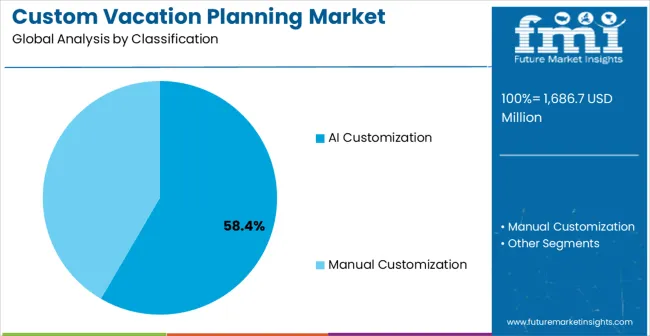
The AI customization segment represents the dominant force in the custom vacation planning market, capturing approximately 58.4% of total market share in 2025. This advanced technology category encompasses platforms equipped with sophisticated machine learning algorithms, including predictive analytics systems and automated recommendation engines that enable superior personalization and customer experience optimization procedures. The AI customization segment's market leadership stems from its superior efficiency capabilities, with systems capable of processing thousands of travel preferences simultaneously while maintaining consistent service quality and personalized recommendations across all customer interactions.
The manual customization segment maintains a substantial 31.2% market share, serving travel agencies and companies that require personalized consultation services with human expertise for complex travel arrangements. These services offer high-touch solutions for luxury travel operations while providing sufficient customization capabilities to meet premium customer service demands. The remaining market segments, categorized as hybrid or specialty systems, account for approximately 10.4% of the market, serving niche applications requiring specific customization approaches or specialized service configurations.
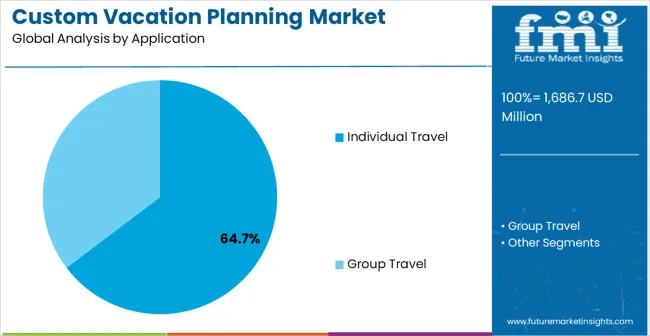
Individual travel applications dominate the custom vacation planning market with approximately 64.7% market share in 2025, reflecting the growing trend toward personalized travel experiences and independent travel planning among global consumers. The individual travel segment's market leadership is reinforced by increasing disposable income, changing travel preferences toward unique experiences, and rising demand for flexible travel arrangements that cater to personal interests and schedules.
The group travel segment represents the substantial secondary application category, capturing 35.3% market share through specialized requirements for family travel, corporate groups, and organized tour packages. This segment benefits from growing demand for coordinated travel experiences that require complex logistics management, group accommodation arrangements, and activity coordination across multiple travelers with varying preferences and requirements.
The market is driven by three concrete demand factors tied to travel experience enhancement outcomes. First, post-pandemic travel recovery and pent-up travel demand create an increasing need for sophisticated planning solutions, with global tourism projected to exceed pre-2019 levels by 15-20% in major travel markets worldwide, requiring a comprehensive, personalized travel planning infrastructure. Second, digital transformation initiatives and consumer technology adoption drive mandatory implementation of AI-powered solutions, with many travel companies setting targets for 70-80% digital engagement by 2030. Third, technological advancements in artificial intelligence and data analytics enable more accurate and efficient personalization solutions, reducing planning time while improving customer satisfaction and booking conversion rates.
Market restraints include high technology development costs that can deter smaller travel agencies from implementing advanced AI platforms, particularly in developing regions where funding for digital transformation remains limited. Data privacy and security concerns pose another significant challenge, as handling personal travel preferences and financial information requires comprehensive security protocols and regulatory compliance, potentially causing implementation delays and increased operational costs. Market fragmentation across different travel service providers creates additional complexity for platform integration, demanding ongoing investment in API development and partnership management.
Key trends indicate accelerated adoption in Asia-Pacific markets, particularly China and India, where rapid digital adoption and growing middle-class travel demand drive comprehensive custom planning platform development. Technology integration trends toward intelligent recommendation systems with real-time pricing optimization, dynamic itinerary adjustment, and integrated social sharing capabilities enable proactive customer engagement approaches that increase booking rates and customer loyalty. However, the market thesis could face disruption if alternative travel booking methods or significant changes in consumer travel behavior minimize reliance on traditional custom planning platforms.
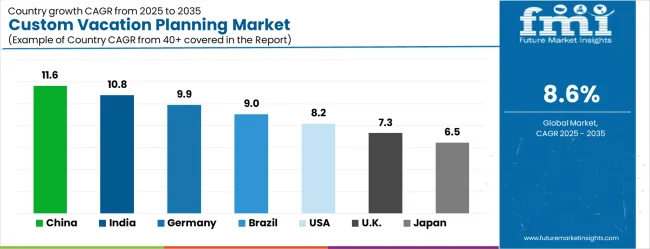
| Country | CAGR (2025-2035) |
|---|---|
| China | 11.6% |
| India | 10.8% |
| Germany | 9.9% |
| Brazil | 9.0% |
| USA | 8.2% |
| UK | 7.3% |
| Japan | 6.5% |
The custom vacation planning market is accelerating worldwide, with China taking the lead thanks to massive digital transformation and government-backed tourism modernization programs. Close behind, India benefits from expanding middle-class travel demand and technology adoption initiatives, positioning itself as a strategic growth hub in the Asia-Pacific region. Germany shows robust advancement, where integration of advanced AI technologies strengthens its role in the European travel technology ecosystem.
Brazil is focusing on tourism digitalization and travel industry modernization, signaling an ambition to capitalize on growing opportunities in South American travel markets. Meanwhile, the USA stands out for its advanced platform development in existing travel systems, and the UK and Japan continue to record consistent progress in travel technology adoption. Together, China and India anchor the global expansion story, while the rest build stability and diversity into the market's growth path.
The report covers an in-depth analysis of 40+ countries, with top-performing countries highlighted below.
China demonstrates the strongest growth potential in the Custom Vacation Planning Market with a CAGR of 11.6% through 2035. The country's leadership position stems from massive digital transformation projects, government-backed tourism development programs, and advanced technology adoption, driving the implementation of AI-powered planning systems.
Growth is concentrated in major metropolitan areas, including Beijing, Shanghai, Guangzhou, and Shenzhen, where technology companies and travel platforms are implementing advanced customization solutions for enhanced customer experiences and market competitiveness. Distribution channels through major technology platforms and integrated super-app ecosystems expand deployment across tourism infrastructure and travel service providers. The country's digital economy strategy provides policy support for travel technology innovation, including AI-powered planning system development.
The custom vacation planning market demonstrates strong growth momentum with a CAGR of 10.8% through 2035, linked to rising disposable income and increasing focus on technology-enabled travel solutions. In Mumbai, Delhi, Bangalore, and Chennai, the adoption of custom vacation planning platforms is accelerating across travel agencies and technology companies, driven by smartphone penetration growth and government Digital India initiatives.
Indian travel companies are implementing AI-powered planning systems and mobile platforms to enhance customer engagement while meeting growing demand for personalized travel experiences among urban populations. The country's tourism promotion policies create demand for digital planning solutions, while increasing emphasis on startup ecosystem development drives adoption of innovative travel technology platforms.
The custom vacation planning market Maintains robust growth through focus on technology standardization and user experience optimization, with a CAGR of 9.9% through 2035. The advanced travel industry demonstrates sophisticated implementation of custom vacation planning platforms, with documented case studies showing 45% improvement in booking conversion rates through AI-powered personalization systems.
The country's travel infrastructure in major cities, including Berlin, Munich, Hamburg, and Frankfurt, showcases integration of advanced planning technologies with existing booking systems, leveraging expertise in software engineering and customer experience design. German travel companies emphasize data privacy and security standards, creating demand for high-compliance planning solutions that support GDPR requirements and customer trust initiatives.
The custom vacation planning market in Brazil market expanding at a CAGR of 9.0% is driven by diverse tourism demand, including domestic travel in São Paulo and Rio de Janeiro, international tourism promotion, and comprehensive travel industry modernization across multiple regions. The demand is supported by federal tourism development programs and regional technology adoption initiatives.
Brazilian travel companies face implementation challenges related to technology infrastructure constraints and digital literacy variations, requiring phased deployment approaches and user education programs. The growing tourism revenue targets and customer experience requirements create compelling business cases for custom planning platform adoption, particularly in major tourist destinations where service differentiation has a direct impact on market competitiveness.
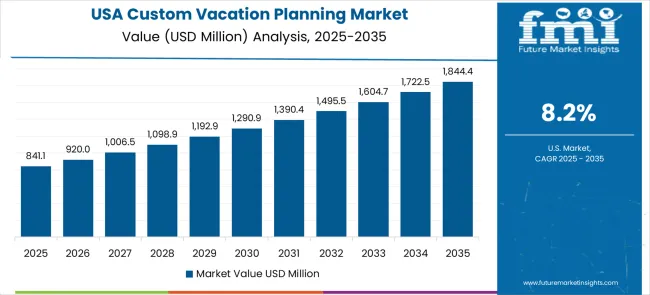
The USA market leads in advanced travel platform innovation based on integration with comprehensive travel ecosystems and sophisticated personalization technologies for enhanced customer experiences. The country shows strong potential with a CAGR of 8.2% through 2035, driven by travel industry recovery programs and expansion of technology-enabled travel services across major metropolitan areas, including New York, Los Angeles, San Francisco, and Miami.
American travel companies are adopting AI-powered planning systems for customer engagement improvement and operational efficiency, particularly in regions with high tourism volumes and competitive travel markets requiring advanced differentiation strategies. Technology deployment channels through established travel agencies and direct-to-consumer platforms expand coverage across leisure and business travel segments.
The custom vacation planning market shows solid growth potential with a CAGR of 7.3% through 2035, linked to travel industry recovery programs, technology modernization initiatives, and emerging customer experience requirements in competitive travel markets. In London, Manchester, Edinburgh, and other major cities, travel companies are implementing custom vacation planning solutions to enhance customer service capabilities and improve competitive positioning, with documented case studies showing a 35% increase in customer retention through personalized planning services.
British travel companies are adopting intelligent planning and recommendation platforms to enhance service reliability while maintaining customer satisfaction standards demanded by discerning UK travelers. The country's established tourism infrastructure creates demand for technology upgrade solutions that integrate with existing booking and service systems.
The custom vacation planning market in Japan maintains steady growth momentum with a CAGR of 6.5% through 2035, driven by travel companies' emphasis on service excellence and continuous improvement methodologies that align with omotenashi hospitality principles applied to digital experiences. The country demonstrates sophisticated implementation focused on user experience excellence and service quality optimization, with documented integration of advanced planning systems, achieving 40% improvement in customer satisfaction across travel and tourism facilities. Major metropolitan areas, including Tokyo, Osaka, Kyoto, and Fukuoka, showcase advanced deployment of intelligent planning platforms where systems integrate seamlessly with existing tourism infrastructure and comprehensive service management programs.
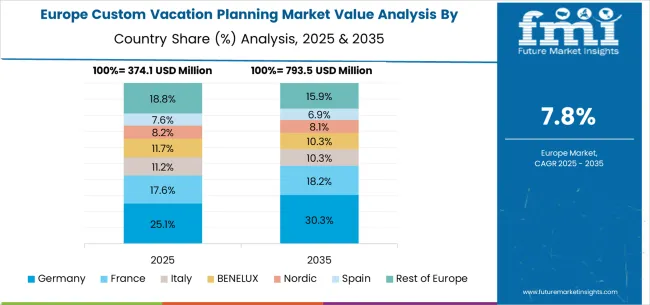
The custom vacation planning market in Europe is projected to grow from USD 421.7 million in 2025 to USD 962.2 million by 2035, registering a CAGR of 8.6% over the forecast period. Germany is expected to maintain its leadership position with a 32.8% market share in 2025, declining slightly to 32.2% by 2035, supported by its extensive travel technology infrastructure and major metropolitan centers, including Berlin, Munich, and Hamburg, as well as its tourism facilities.
The United Kingdom follows with a 19.4% share in 2025, projected to reach 20.1% by 2035, driven by comprehensive travel industry modernization programs in London, Edinburgh, and other strategic areas implementing advanced planning systems. France holds a 16.1% share in 2025, expected to maintain 15.6% by 2035 through ongoing tourism facility upgrades and travel technology development. Italy commands a 14.9% share, while Spain accounts for 11.2% in 2025. The Rest of Europe region is anticipated to gain momentum, expanding its collective share from 5.6% to 6.8% by 2035, attributed to increasing custom planning platform adoption in Nordic countries and emerging Eastern European tourism facilities implementing digitalization programs.
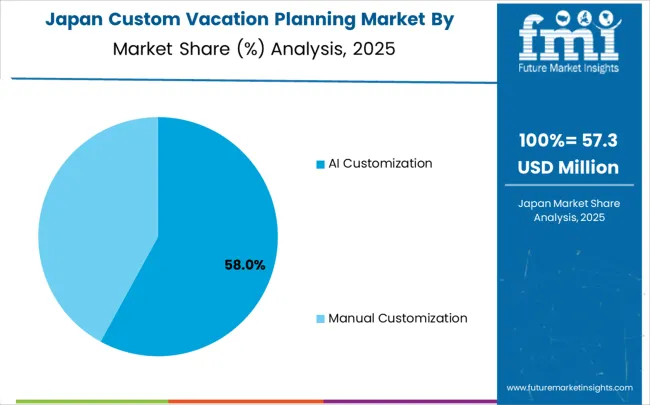
The Japanese Custom Vacation Planning Market demonstrates a mature and service-focused landscape, characterized by sophisticated integration of AI customization planning systems with existing tourism service infrastructure across travel agencies, hotel booking platforms, and specialized experience providers. Japan's emphasis on service excellence and customer satisfaction drives demand for high-reliability planning solutions that support omotenashi hospitality principles and continuous service improvement requirements in travel operations.
The market benefits from strong partnerships between international technology providers like Trip Planner AI, American Express, and domestic travel technology leaders, including JTB Corporation, Rakuten Travel, and H.I.S. Co., creating comprehensive service ecosystems that prioritize user experience and cultural sensitivity programs. Tourism centers in Tokyo, Osaka, Kyoto, and other major destinations showcase advanced personalization implementations where planning systems achieve 96% customer satisfaction through integrated recommendation programs.
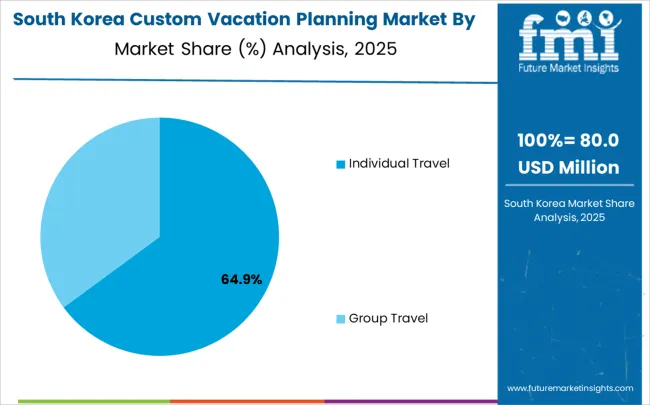
The South Korean Custom Vacation Planning Market is characterized by strong international technology provider presence, with companies like Trip Planner AI, American Express, and Hong Kong Tourism Board maintaining significant positions through comprehensive platform integration and localization services capabilities for travel agencies and tourism applications. The market is demonstrating growing emphasis on mobile-first solutions and social media integration, as Korean travelers increasingly demand platforms that integrate with domestic social networks and advanced mobile payment systems deployed across Seoul and major tourist destinations.
Local travel technology companies and regional platform developers are gaining market share through strategic partnerships with global providers, offering specialized services including Korean language optimization and cultural customization programs for international visitors. The competitive landscape shows increasing collaboration between multinational travel platform companies and Korean tourism technology specialists, creating hybrid service models that combine international travel expertise with local cultural knowledge and customer preference management.
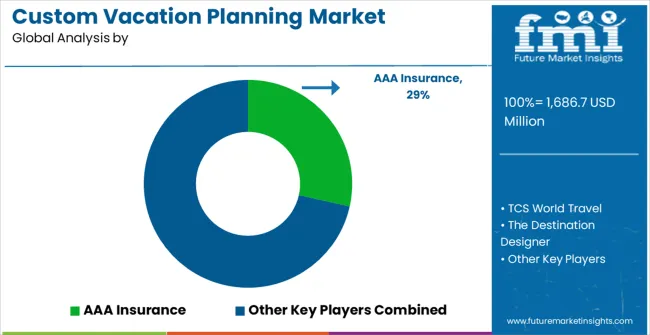
The Custom Vacation Planning Market features approximately 25-30 meaningful players with moderate concentration, where the top three companies control roughly 35-42% of global market share through established technology platforms and extensive travel industry relationships. Competition centers on personalization capabilities, user experience quality, and technology innovation rather than price competition alone.
Market leaders include American Express, TCS World Travel, and Trip Planner AI, which maintain competitive advantages through comprehensive travel solution portfolios, global service networks, and deep expertise in the travel technology sector, creating high switching costs for customers. These companies leverage customer data relationships and ongoing platform engagement to defend market positions while expanding into adjacent travel service applications.
Challengers encompass The Destination Designer and Hong Kong Tourism Board, which compete through specialized planning solutions and strong regional presence in key travel markets. Technology specialists, including Jess. Travel, Wonderplan, and Tripmasters focus on specific customization technologies or vertical applications, offering differentiated capabilities in AI recommendation engines, user interface design, and booking platform integration.
Regional players and emerging technology providers create competitive pressure through innovative solutions and rapid deployment capabilities, particularly in high-growth markets including China and India, where local presence provides advantages in cultural understanding and regulatory compliance. Market dynamics favor companies that combine advanced AI technologies with comprehensive service offerings that address the complete travel planning lifecycle from inspiration through booking and post-travel engagement.
| Item | Value |
|---|---|
| Quantitative Units | USD 1,686.7 million |
| Customization Mode | Manual Customization, AI Customization |
| Application | Individual Travel, Group Travel |
| Regions Covered | Asia Pacific, Europe, North America, Latin America, Middle East & Africa |
| Country Covered | China, India, Germany, Brazil, the USA, the UK, Japan, and 40+ countries |
| Key Companies Profiled | AAA Insurance, TCS World Travel, The Destination Designer, Trip Planner AI, Hong Kong Tourism Board, Jess. Travel, Tripmasters, American Express, Go Real Travel, Salt & Wind Travel |
| Additional Attributes | Dollar sales by customization mode and application categories, regional adoption trends across Asia Pacific, Europe, and North America, competitive landscape with technology providers and platform integrators, travel facility requirements and specifications, integration with smart travel initiatives and booking platforms, innovations in AI planning technology and personalization systems, and development of specialized applications with customer experience and efficiency capabilities. |
The global custom vacation planning market is estimated to be valued at USD 1,686.7 million in 2025.
The market size for the custom vacation planning market is projected to reach USD 3,848.9 million by 2035.
The custom vacation planning market is expected to grow at a 8.6% CAGR between 2025 and 2035.
The key product types in custom vacation planning market are ai customization and manual customization.
In terms of application, individual travel segment to command 64.7% share in the custom vacation planning market in 2025.






Our Research Products

The "Full Research Suite" delivers actionable market intel, deep dives on markets or technologies, so clients act faster, cut risk, and unlock growth.

The Leaderboard benchmarks and ranks top vendors, classifying them as Established Leaders, Leading Challengers, or Disruptors & Challengers.

Locates where complements amplify value and substitutes erode it, forecasting net impact by horizon

We deliver granular, decision-grade intel: market sizing, 5-year forecasts, pricing, adoption, usage, revenue, and operational KPIs—plus competitor tracking, regulation, and value chains—across 60 countries broadly.

Spot the shifts before they hit your P&L. We track inflection points, adoption curves, pricing moves, and ecosystem plays to show where demand is heading, why it is changing, and what to do next across high-growth markets and disruptive tech

Real-time reads of user behavior. We track shifting priorities, perceptions of today’s and next-gen services, and provider experience, then pace how fast tech moves from trial to adoption, blending buyer, consumer, and channel inputs with social signals (#WhySwitch, #UX).

Partner with our analyst team to build a custom report designed around your business priorities. From analysing market trends to assessing competitors or crafting bespoke datasets, we tailor insights to your needs.
Supplier Intelligence
Discovery & Profiling
Capacity & Footprint
Performance & Risk
Compliance & Governance
Commercial Readiness
Who Supplies Whom
Scorecards & Shortlists
Playbooks & Docs
Category Intelligence
Definition & Scope
Demand & Use Cases
Cost Drivers
Market Structure
Supply Chain Map
Trade & Policy
Operating Norms
Deliverables
Buyer Intelligence
Account Basics
Spend & Scope
Procurement Model
Vendor Requirements
Terms & Policies
Entry Strategy
Pain Points & Triggers
Outputs
Pricing Analysis
Benchmarks
Trends
Should-Cost
Indexation
Landed Cost
Commercial Terms
Deliverables
Brand Analysis
Positioning & Value Prop
Share & Presence
Customer Evidence
Go-to-Market
Digital & Reputation
Compliance & Trust
KPIs & Gaps
Outputs
Full Research Suite comprises of:
Market outlook & trends analysis
Interviews & case studies
Strategic recommendations
Vendor profiles & capabilities analysis
5-year forecasts
8 regions and 60+ country-level data splits
Market segment data splits
12 months of continuous data updates
DELIVERED AS:
PDF EXCEL ONLINE
Custom Packaging Box Market Size and Share Forecast Outlook 2025 to 2035
Custom Face Care Market Forecast Outlook 2025 to 2035
Customized Skincare Market Size and Share Forecast Outlook 2025 to 2035
Custom Peptide Synthesis Services Market Size and Share Forecast Outlook 2025 to 2035
Customer Service Software Market Size and Share Forecast Outlook 2025 to 2035
Customer Revenue Optimization (CRO) Software Market Size and Share Forecast Outlook 2025 to 2035
Customer Communications Management Market Size and Share Forecast Outlook 2025 to 2035
Customer Experience Management (CEM) In Telecommunication Market Size and Share Forecast Outlook 2025 to 2035
Custom Dry Ingredients Blends Market Analysis - Size, Share and Forecast Outlook 2025 to 2035
Customer Engagement Hub (CEH) Market Size and Share Forecast Outlook 2025 to 2035
Custom Probiotics Market Size and Share Forecast Outlook 2025 to 2035
Customer Journey Analytics Software Market Size and Share Forecast Outlook 2025 to 2035
Customer-To-Customer (C2C) Community Marketing Software Market Size and Share Forecast Outlook 2025 to 2035
Customer Journey Mapping Software Market Size and Share Forecast Outlook 2025 to 2035
Customized Premix Market Analysis - Size, Share, & Forecast Outlook 2025 to 2035
Custom Binders Market Growth & Industry Forecast 2025 to 2035
Custom Printed Tape Market Size and Share Forecast Outlook 2025 to 2035
Customisation and Personalisation in Travel Market Size and Share Forecast Outlook 2025 to 2035
Customer-Facing Technology Market Size and Share Forecast Outlook 2025 to 2035
Custom Display Packaging Market Analysis - Size, Share, and Forecast Outlook 2025 to 2035

Thank you!
You will receive an email from our Business Development Manager. Please be sure to check your SPAM/JUNK folder too.
Chat With
MaRIA